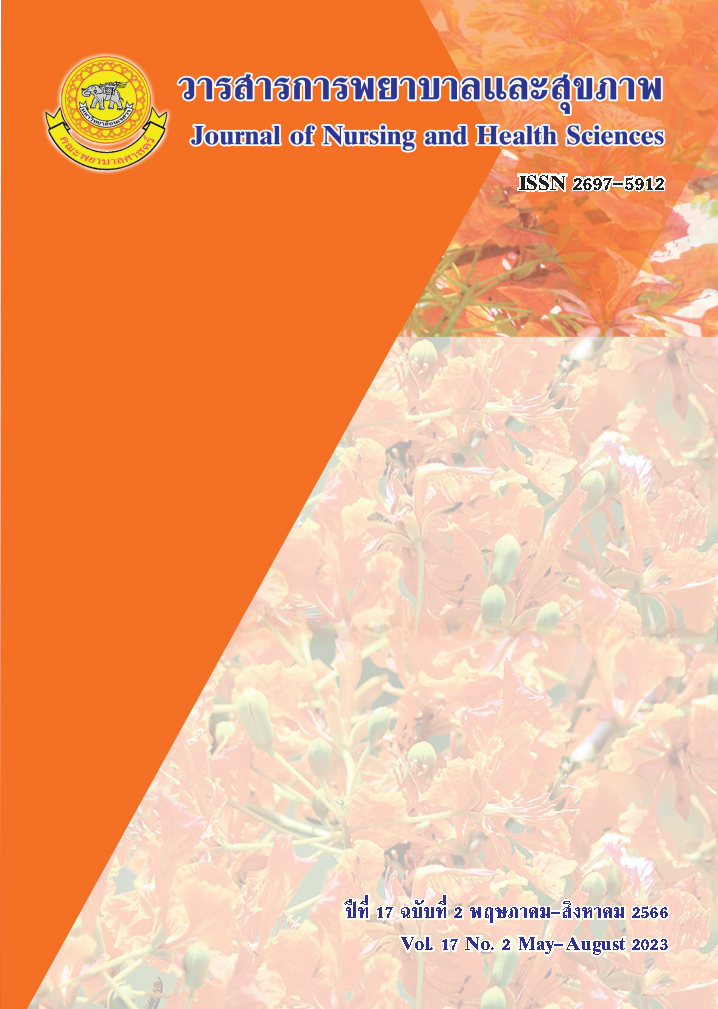ปัจจัยที่สัมพันธ์กับการส่งเสริมความร่วมมือในการรักษาด้วยยาในผู้ป่วยโรคเรื้อรังของบุคลากรสาธารณสุข
Main Article Content
บทคัดย่อ
การวิจัยเชิงพรรณนาครั้งนี้มีวัตถุประสงค์เพื่อศึกษาปัจจัยที่สัมพันธ์กับการส่งเสริมความร่วมมือในการรักษาด้วยยาสำหรับผู้ป่วยโรคเรื้อรังของบุคลากรสาธารณสุข กลุ่มตัวอย่างคือ บุคลากรสาธารณสุข จำนวน 76 คน เก็บข้อมูลด้วย แบบสอบถามการส่งเสริมความร่วมมือในรักษาด้วยยา และแบบสอบถามปัจจัยเงื่อนไข มีค่าดัชนีความตรงตามเนื้อหา (CVI) = 1.0 ค่าสัมประสิทธิ์ครอนบาคอัลฟ่า (α) เท่ากับ 0.97 และ 0.95 ตามลำดับ วิเคราะห์ข้อมูลด้วยสถิติเชิงพรรณนา สหสัมพันธ์พอยท์ไบซีเรียล และสหสัมพันธ์ของเพียร์สัน ผลการวิจัย พบว่า
1).บุคลากรสาธารณสุขมีการส่งเสริมความร่วมมือในการรักษาด้วยยาสำหรับผู้ป่วยโรคเรื้อรังโดยรวมอยู่ในระดับมาก ( = 3.07, S.D. = 0.62) โดยด้านการสื่อสารเพื่อการรักษาที่มีประสิทธิภาพ ( = 3.19, S.D. = 0.65) มากที่สุด และด้านการประเมินความร่วมมือ ( = 2.98, S.D. = 0.58) น้อยที่สุด
2).การอบรมที่เกี่ยวข้อง ปัจจัยด้านผู้ป่วย ปัจจัยด้านบุคลากร และปัจจัยด้านระบบ มีความสัมพันธ์ทางบวกกับการส่งเสริมความร่วมมือในการรักษาด้วยยาอย่างมีนัยสำคัญทางสถิติ (rpb = .32, p < .01; r = .33, p < .01; r = .36, p < .01 และ r = .27, p < .05 ตามลำดับ) ผลการวิจัยนี้แสดงให้เห็นว่าปัจจัยด้านผู้ป่วย ด้านบุคลากร และด้านระบบบริการ มีความสำคัญกับการส่งเสริมความร่วมการรักษาด้วยยาสำหรับผู้ป่วยโรคเรื้อรัง และบุคลากรสาธารณสุขที่ปฏิบัติงานเกี่ยวกับผู้ป่วยโรคเรื้อรัง ควรได้รับการอบรมความรู้และเทคนิคการส่งเสริมความร่วมมือในการรักษาด้วยยา
Article Details

อนุญาตภายใต้เงื่อนไข Creative Commons Attribution-NonCommercial-NoDerivatives 4.0 International License.
เอกสารอ้างอิง
Bailey, S. C., Oramasionwu, C. U., & Wolf, M. S. (2013).Rethinking adherence: a health literacy-informed model of medication self-management. Journal of Health Communication, 18 Suppl 1(Suppl 1), 20–30.
Bowen, J. F., Rotz, M. E., Patterson, B. J., & Sen, S.(2017). Nurses’ attitudes and behaviors on patient medication education. Pharmacy Practice, 15(2),930. https://doi.org/10.18549/PharmPract.2017.02.930.
Brown, M. T., Bussell, J., Dutta, S., Davis, K., Strong,S., & Mathew, S. (2016). Medication adherence:Truth and consequences. The American Journal of the Medical Sciences, 351(4), 387–399.
Byrne, J., Willis, A., Dunkley, A., Fitzpatrick, C.,Campbell, S., Sidhu, M. S., Choudhary, P., Davies,M. J., & Khunti, K. (2022). Individual, healthcareprofessional and system-level barriers and facilitators to initiation and adherence to injectable therapies for type 2 diabetes: A systematic review and metaethnography. Diabetic Medicine: A Journal of the British Diabetic Association, 39(1), e14678. https://doi.org/10.1111/dme.14678.
Chaichanawirote U., Juntarawijit Y., & Songthai N.(2023). The study of health service system pertaining to medication use for non-communicable chronic disease patients in practice level from the perspectives of health care providers and clients. Health System Research Institute. Phitsanulok: Faculty of Nursing Naresuan University. [In Thai].
Chuaichum, C., & Jitpanya, C. (2014). Factors related to medication adherence in patients with epilepsy. Princess of Naradhiwas University Journal, 6(1). 36-47. [In Thai].
Curtis, S. E., Boye, K. S., Lage, M. J., & Garcia-Perez,L. E. (2017). Medication adherence and improved outcomes among patients with type 2 diabetes. The American Journal of Managed Care, 23(7),e208–e214.
Division of Non-communicable Diseases. (2023).Statistics of non-communicable diseases. Retrieved 14 April 2023 from http://www.thaincd.com/2016/mission/documentsdetail.php?id=14480&tid=32&gid=1-020 [In Thai]
Division of Non-communicable Diseases. (2020).Situation of non-communicable diseases report:Diabetes Mellitus, Hypertension and related risk factors. Bangkok: Aksorn Graphic and Design.Gast, A., & Mathes, T. (2019). Medication adherence influencing factors—an (updated) overview of systematic reviews. BMC Systematic Reviews, 8,112. https://doi.org/10.1186/s13643-019-1014-8.Hsu, C., Lemon, J. M., Wong, E. S., Carson-Cheng, E., Perkins, M., Nordstrom, M. S., Liu, C. F., Sprague,
C., & Bryson, C. L. (2014). Factors affecting medication adherence: Patient perspectives from five veteran affairs facilities. BMC Health Services Research, 14, 533. https://doi.org/10.1186/s12913-014-0533-1. Jose, J., Jimmy, B., Al-Mamari, M. N., Al-Hadrami, T.
S., & Al-Zadjali, H. M. (2015). Knowledge, beliefs and behaviours regarding the adverse effects of medicines in an Omani population: Cross-sectional survey. Sultan Qaboos University Medical Journal,15(2), e250–e256.
Khamrag, C., Wattanakitkrilert, D., Charoenkitkarn, V.,& Dejsomritrutai, W. (2016). Influences of perceived medication necessity, medication concern, side effects,and treatment-time on inhaled corticosteroids adherence in adult patients with asthma. Nursing Science Journal of Thailand, 34(2), 73–82. [In Thai].
Kini, V., & Ho, P. M. (2018). Interventions to improve medication adherence: A review. JAMA, 320(23), 2461–2473. https://doi.org
/10.1001/jama.2018.19271.Lehmann, A., Aslani, P., Ahmed, R., Celio, J., Gauchet,A., Bedouch, P., Bugnon, O., Allenet, B., &Schneider, M. P. (2014). Assessing medication adherence: Options to consider. International Journal of Clinical Pharmacy, 36(1), 55–69. https://doi.org/10.1007/s11096-013-9865-x.
Marquis, J., Schneider, M. P., Spencer, B., Bugnon, O.,& Du Pasquier, S. (2014). Exploring the implementation of a medication adherence programme by community pharmacists: A qualitative study. International Journal of Clinical Pharmacy, 36(5),1014–1022. https://doi.org/10.1007/s11096-014-9989-7.
Onakomaiya, D., Cooper, C., Barber, A., Roberts, T.,Gyamfi, J., Zanowiak, J., Islam, N., Ogedegbe, G.,& Schoenthaler, A. (2022). Strategies to improve medication adherence and blood pressure among racial/ethnic minority populations: A scoping review
of the literature from 2017 to 2021. Current Hypertension Reports, 24(12), 639–654. https://doi.org/10.1007/s11906-022-01224-2.
Phisanulok provincial office. (2021). Information system.Retrieved 20 January from www.plkhealth.go.th.Prommaloon, S., Wattanakitkrileart, D., Charoenkitkarn,V., & Peerapatdit, T. (2017). Factors influencing insulin adherence in patients with type 2 diabetes.Nursing Science Journal of Thailand, 35(1), 61–71.Retrieved from https://he02.tci-thaijo.org/index.php/ns/article/view/90179. [In Thai].
Rattine-Flaherty, E., & Burton, S. (2021). The role of pharmacy personnel in promoting adherence to antiretroviral therapy in the Eastern Cape: Communication barriers and breakthroughs. African Journal of AIDS Research : AJAR, 20(2), 165–171. https://doi.org/10.2989/16085906.2021.1925310.
Uraisripong, K., Wattanakitkrileart, D., Charoenkitkarn,V., & Chuchottaworn, C. (2017). Factors influencing adherence to inhaled long acting bronchodilators with corticosteroid in patient with chronic obstructive pulmonary disease. Nursing Science Journal of
Thailand, 35(2), 86–99. Retrieved from https://he02.tci-thaijo.org/index.php/ns/article/view/94212. [InThai].
Wilhelmsen, N. C., & Eriksson, T. (2019). Medication adherence interventions and outcomes: An overview of systematic reviews. European Journal of Hospital Pharmacy: Science and Practice, 26(4),187–192. https://doi.org/10.1136/ejhpharm-2018-
World Health Organization. (2003) Adherence to long-term therapies: Evidence for action. Geneva.Zeng, Z., Wu, T., Lv, M., Qian, J., Chen, M., Fang, Z.,
Jiang, S., & Zhang, J. (2022). Impact of mobile healthand telehealth technology on medication adherence of stroke patients: A systematic review and meta-analysis of randomized controlled trials.International Journal of Clinical Pharmacy, 44(1),4–14. https://doi.org/10.1007/s11096-021-01351-x.


